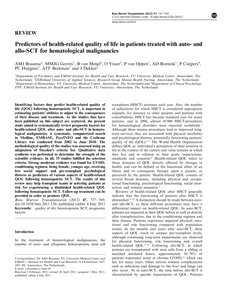BACKGROUND: The survival rates for patients with advanced cancer have increased over time. Many patients experience symptoms and functional limitations that impair activities of daily living and limit quality of life. A number of these health problems are amenable to physical therapist treatment. However, physical therapists caring for patients with advanced cancer require special training and skills.OBJECTIVE: The study aimed to assess the educational needs and clinical uncertainties of Dutch physical therapists in relation to treatment of patients with advanced cancer.DESIGN: This was a mixed methods study.METHODS: A survey and 2 focus groups were conducted among physical therapists working in primary care who had previously received at least basic oncology training.RESULTS: A total of 162 physical therapists completed the survey. The most frequently reported educational needs were related to effective interprofessional collaboration (61.7%), knowledge of medical treatment (49.4%), and current evidence on physical therapist interventions in this population (49.4%). In the focus groups, physical therapists (n = 17) voiced uncertainties about treating patients with bone metastases, setting realistic goals, when and how to end a treatment episode, interprofessional collaboration, finding and using evidence, and using clinimetrics.CONCLUSION: These results support the need for specific education programs for physical therapists working with advanced cancer patients to increase the availability of high-quality oncology rehabilitation for this population.
DOCUMENT
Identifying factors that predict health-related quality of life (QOL) following hematopoietic SCT, is important in estimating patients’ abilities to adjust to the consequences of their disease and treatment. As the studies that have been published on this subject are scattered, the present study aimed to systematically review prognostic factors for health-related QOL after auto- and allo-SCT in hematological malignancies. A systematic, computerized search in Medline, EMBASE, PsycINFO and the Cochrane Library was conducted from 2002 to June 2010. The methodological quality of the studies was assessed using an adaptation of Hayden's criteria list. Qualitative data synthesis was performed to determine the strength of the scientific evidence. In all, 35 studies fulfilled the selection criteria. Strong–moderate evidence was found for GVHD, conditioning regimen, being female, younger age, receiving less social support and pre-transplant psychological distress as predictors of various aspects of health-related QOL following hematopoietic SCT. The results of this review may help transplant teams in selecting patients at risk for experiencing a diminished health-related QOL following hematopoietic SCT. Follow-up treatment can be provided in order to promote QOL.
DOCUMENT
